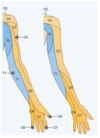Extensor Forearm and Dorsum Hand Flashcards
De Quervain’s tenosynovitis
Excessive friction of tendons in sheath 1: abductor pollicus longus, extensor pollicis brevis
- Leads to fibrous thickening of sheath and stenosis of osseofibrous tunnel

Synovial cyst
Non-tender cystic swelling foudn in association with the synovial sheaths on the dorsum of the hand
- Most commonly found at the distal attachment of extensor carpi radialis brevis muscle

Three muscle tendons bound to anatomical snuff box
Anterior borders: tendons of abductor pollicis longus and extensor pollicis brevis
Posterior border: tend of extensor pollicis longus
The scaphoid bone can be palpated deep within the anatomical snuff box and pain felt there indicates a fracture of the scaphoid bone
Cutaneous domains of hand by median, ulner, and radial nerves

Dermatomes of thumb, index, and pinkey fingers
Thumb = C6
Index = C7
Pinkey = C8

Clinical assesment of radial nerve
- Inability to extend wrist and digits (wristdrop)
- Inability to supinate hadn and forearm
- Loss of sensation in the dorsal base of thumb
Clinical assesment of ulnar nerve
- Loss of adduction and abduction of fingers
- Loss of flexion of the MCP
- Loss of extension of IP joints of ring and middle fingers
- Sensory loss on palmar and dorsal aspects of half of the ring finger and the pinkey
- Associated with characteristic ulnar claw

Allen test
A test for abnormal circulation in the hand
- Have patient make fist and elevate hand for 30 seconds
- Apply pressure over the ulnar and radial arteries to occlude them
- Have patient relax hand while still elevated (should appear blanched)
- Release pressure on ulnar artery
- Positive (good) result is hand returns to normal color
- Negative result means that ulnar arterial supply to hand is compromise and cannot be safely cannulated

How to stop palmar arch bleeding
Must put pressur eon brachial artery near cubital fossa

Etiology and symptoms of Raynaud’s
Excessivley reduced blood flow in response to cold or emptional stress
- When bloodflow is returned, skin turns red, then normal, and then often has swelling and painful “pins and needles” sensation
Potentially caused by hyperactivation of sympathetic nervous system causing extreme vasoconstriction of peripheral blood vessels


